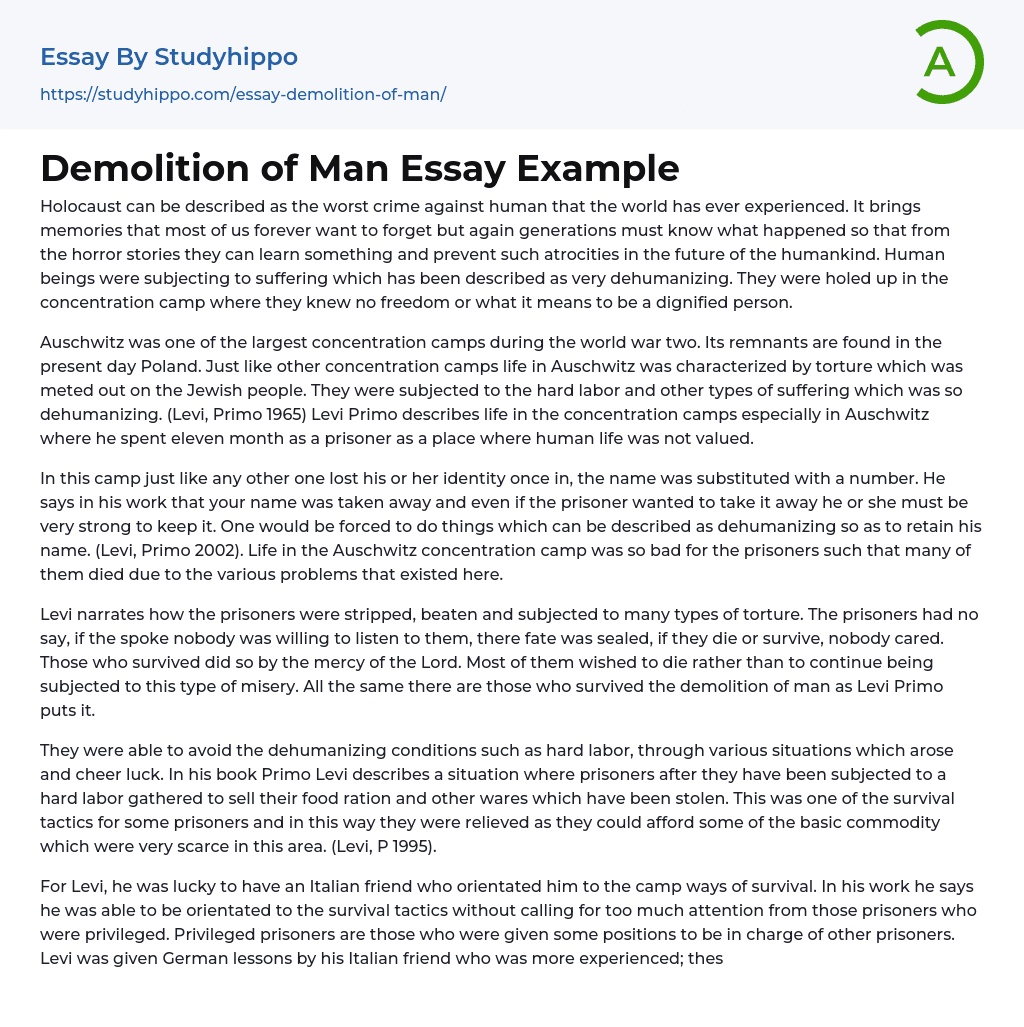The Holocaust, which is widely regarded as the worst crime ever committed against humanity, is a memory that many people try to erase. However, it is crucial for future generations to comprehend what happened during this period in order to prevent any repetition of such dreadful acts. The individuals who lived through this time experienced immense suffering and were dehumanized as they were imprisoned in concentration camps, where they lost their freedom and dignity.
Auschwitz, located in present day Poland, was a major concentration camp during World War Two. Similar to other camps, life in Auschwitz involved torture and suffering inflicted upon Jewish people. They endured harsh labor and dehumanizing experiences. Primo Levi, who spent eleven months as a prisoner in Auschwitz, depicts it as a place where human life held no value. (Levi,
...Primo 1965)
In this camp, like any other, one's identity was lost upon entry, and their name was replaced with a number. According to Levi, prisoners would have to be strong to retain their name, as it could easily be taken away. The conditions in the Auschwitz concentration camp were so terrible that many prisoners died. (Levi, Primo 2002).
In the text, Levi Primo recounts the prisoners' brutal treatment, such as being stripped, beaten, and subjected to different forms of torture. The prisoners were voiceless since no one was willing to listen to them. Their future was already decided, with nobody showing concern for their lives. Survival relied solely on God's mercy. Many would have preferred death over enduring such suffering. However, there were a few who somehow survived humanity's destruction, as described by Levi Primo.
<
style="text-align: justify">
Throughout various situations and strokes of luck, the prisoners managed to evade the dehumanizing conditions of hard labor. In his book, Primo Levi recounts a scenario where prisoners, having endured grueling labor, assembled to sell their stolen food rations and other belongings. This tactic served as a means of survival for certain prisoners, providing them with relief as they were finally able to afford some of the scarce basic commodities in the area (Levi, P 1995).
Levi feels lucky to have had an Italian companion in the camp who instructed him on survival techniques. He acquired these essential skills discreetly, so as not to attract notice from the privileged prisoners who held power over others. With his friend's greater expertise, Levi also learned German, a valuable asset that helped him evade certain hardships encountered by fellow prisoners.
Most prisoners died from starvation. Food was scarce and not distributed equally. Those who couldn't find food starved to death. Levi and some other prisoners avoided hunger by forming connections with supervisors. Lorenzo Ponone was particularly helpful to Levi, providing him with ration soup that gave him strength to continue in the camp's humiliating conditions.
Levi's scientific expertise spared him from the arduous tasks assigned to fellow prisoners at the factory. The testimonies of survivors have played a crucial role in increasing awareness about the destructive consequences of hatred. It is important for us all to glean valuable insights from this grim era and collectively commit to ensuring that no individual endures such brutal mistreatment ever again.
- Anne Frank essays
- Feminism essays
- Animal Rights essays
- Animal Testing essays
- Bullying essays
- Abortion essays
- Abuse essays
- Immigration essays
- Poverty essays
- Human Rights essays
- Inequality essays
- Violence essays
- Torture essays
- Crash essays
- Assault essays
- Racism essays
- Prejudice essays
- Controversial Issue essays
- Cyber Bullying essays
- Women's Suffrage essays
- Women'S Rights essays
- Women Empowerment essays
- Sojourner Truth essays
- Bullying In Schools essays
- Pro Choice essays
- Pro Life essays
- Should Abortion Be Legal essays
- Against abortion essays
- Abortion Debate essays
- Abuse Support essays
- Child Abuse essays
- Alcohol Abuse essays
- Physical Abuse essays
- Sexual Abuse essays
- Substance Abuse essays
- Migration essays
- Human Migration essays
- Illegal Immigration essays
- Immigrants essays
- Refugee essays
- Overpopulation essays
- Homelessness essays
- Hunger essays
- Dumpster Diving essays
- Homelessness In America essays
- Euthanasia essays
- Assisted Suicide essays
- Censorship essays
- Gun Control essays
- Empowerment essays




